The Sizanani Effect
By Elizabeth Chiles Shelburne '01
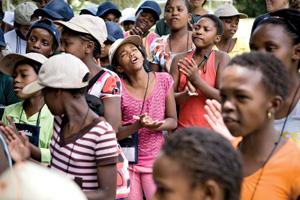 Most of the campers have been touched by tragedies that one hopes children will never have to bear. Still, they sing. |
In a rural area two hours north of Johannesburg, South Africa, a massive campfire is roaring, warming the bodies of 150 South Africans against a cool spring night in late September. The fire lights their faces as they sway back and forth, singing. Most of those gathered range in age from 11 to 17, but there are older men and women scattered among them, mostly in the front, leading the songs or the dances that sometimes accompany the music. There is no other noise in the night, just the sound of these 150 voices raised together, singing the same words over and over again, so that the words become a rhythmic chant.
Aye, Sizanani goes on,
Sizanani goes on,
Sizanani goes-oes-oes on.
Sizanani is the name of the camp that has brought these kids and their counselors together. They hail from some of the toughest parts of South Africa, and many had never before left the urban sprawl in which they were born. None has been to a camp like this before, and they cannot believe their good fortune in being able to come now, for free. Many of their counselors, whom they call the vochelis, were campers here when they were young and have done whatever they could to come back as counselors. For many of these kids, this opportunity—to be a kid—is a rare one.
Each camp has its own traditions, and on this, the opening day, the campers have learned some of the Sizanani traditions. After several songs, Kabela, one of the vocheli, stands up and quiets the kids. “You are officially welcome to the family of Camp Sizanani!” he tells them. A cheer erupts. He welcomes three of the counselors to speak, and a Sizanani-specific cheer greets each one: “Yeeeaahh! Nooooooo! Fiiiiiive, fooooour, threeeeee, oose, oose, oose, oose.”
“I’m going to call one important person,” he says. “I’m going to call Dr. Phil.” In Zulu, he tells the kids that this man, Dr. Phil, is the one who pays for this camp. There are astonished and approving gasps from the crowd.
Another vocheli stands up and says, “There is one guy who makes it possible that you guys can come and have all this, this experience. One guy who makes sure you enjoy everything and enjoy it to the best, so make sure everything you do you do it to your best, because it was founded by one great person.”
That person is a tanned, nearly bald American who has been standing in the front row, smiling, singing and dancing along, if slightly off beat, to the camp song. He is Phil Lilienthal ’62, and Camp Sizanani is his brainchild. “You’re part of the history of Camp Sizanani,” Lilienthal tells the campers, explaining that this is the 28th camp session and that there have been more than 4,000 campers since 2004. “You are getting to be a very powerful group. After camp is over, we want you to take that power home with you to your community.
“After one day, you’re rocking the whole place,” Lilienthal continues. “We want you to rock Soweto. We want you to rock Krugersdorp. We want you to rock South Africa. So, don’t just have fun. Have fun, but learn what you need to do to change your country, to change your family, all for the better. That’s what you’re here for.”
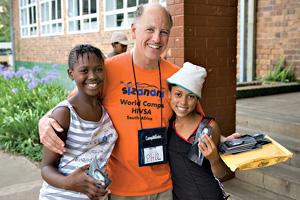 Phil Lilienthal ’62 on one of his frequent trips to the camp he started in South Africa. |
Born in New York City in 1940, Lilienthal grew up in Manhattan but spent his summers in Fayette, Maine, at Camp Winnebago, a camp his father co-owned from 1943 until becoming the sole owner in 1956. Camp Winnebago is an all-boys camp located on the shores of Echo Lake. By the time he graduated from Amherst, Lilienthal had spent enough summers at Camp Winnebago—first as a camper, then a counselor—to understand the draws and drawbacks of the family business. Unsure if he wanted to take it over, Lilienthal went to law school at the University of Virginia, and once he graduated, he immediately moved with his wife, Lynn, to Ethiopia to work in the Peace Corps.
But the camp spirit was hard to shake. Ethiopia at the time was a very segregated place, separated by caste and tribe. Lilienthal saw a residential camp as a way to bridge those gaps. In addition to his legal work with the Peace Corps, he created and ran a camp for a cross-section of Ethiopian kids in central Ethiopia on a piece of land lent to the camp by a relative of Emperor Haile Selassie.
After two years, Lilienthal left Ethiopia to work with the Peace Corps in Washington, D.C., Thailand and the Philippines. He and his father had decided that he would take over the camp when his contract with the Peace Corps ended, and so in 1974, he and his family moved back to the States. Lilienthal became the sole owner and camp director upon his father’s death later that year. He remained the director for 29 years, even as he expanded his private law practice in Reston, Va.
Lilienthal is a fit man with an expansive smile and uncontained energy. Sitting down for an interview at the camp in South Africa, he shifts positions constantly and his hands play uncontrollably with paper, the edge of his hat or whatever is in front of him. For a man with this much energy, even the prospect of retirement was difficult to swallow.
For years, he’d had an idea in the back of his mind: once his children were grown, his working years were behind him and Camp Winnebago was transferred into good hands, he wanted to create a summer camp for kids in Africa. (The camp in Ethiopia had shut down in 1974 when the emperor was overthrown.) He wanted to bring the model to which he’d spent years devoting his life to a place where children rarely have the chance to be children. So, in 2003, he wound down his law practice and completed the handover of Camp Winnebago to his son Andy. (His other son is Ben ’95.) Lilienthal was ready to return to Africa.
“You throw your hat over the wall,” he says, on deciding to pursue this idea. “Then you have to climb over it and go get it.” He sent out a blanket e-mail to everyone he knew, telling them of his plan and asking for help. “I just remember being very scared about the whole thing,” he says. “But once I sent that e-mail, I couldn’t get out of it.”
He did not have a specific nation where he wanted to locate the camp—he felt it was more important to find the right partner organization. He was looking for in-country HIV-education organizations that could coordinate a camp aimed at helping African kids affected by the continent’s HIV/AIDS crisis. By May 2003, he was on a flight to Johannesburg, from which he planned to go to Kenya and Botswana. He knew one person in each country and had a weekend to kill in Johannesburg, so he went about setting up meetings.
At 6 p.m. that Friday, he met with Michelle Shorn of HIVSA, a nonprofit group located at Baragwaneth Hospital in Soweto. A month later, before heading back home after meeting with dozens of people in Botswana and Kenya, he met again with HIVSA, which presented him with a budget and a vision for what the camp could be. Sizanani, which means “to help each other,” was born.
 Camp Sizanani provides a rare opportunity for the children to be playful. |
One very hot morning, at 9 a.m. Sizanani time (the camp runs an hour ahead of the rest of South Africa in order to get the most of the sunlight), some of the girls of Cabin G, who have deemed G far too boring for their purposes and renamed the place “Cabin Glamorous Chicks,” stand in a small circle with a few of the boys from Cabin H (still called H). The vocheli in charge instructs them to stick their hands into the middle of the circle and grab whichever hand is closest. The campers look skeptical as he explains. When he is finished, he asks them, “Ching ching?” The phrase is a piece of camp slang that variously means, Is it good? or Do you understand? The campers respond, as they will hundreds of times over the course of camp, “Ching ching,” meaning, It is good.
These two cabins will spend the week together, going through the seven camp activities—adventure, theater, swimming, sports, arts and crafts, nutrition and life skills. This is the second day.
The leaders quickly emerge from among those in the knot and begin to talk over each other, instructing the others in the group to step over or under one another to untangle the human knot. “Wonderful, wonderful,” says one girl, Pona, as they untangle one side. It’s easy to be blasé about these kinds of games (although none of the kids is), but the truth is they do work—alliances and trust form as each part of the knot gets picked apart.
While camp is camp no matter the locale—with that same camaraderie, exuberant silliness and lightheartedness that invades even the most reluctant camper—these are not kids in the sense that Americans conceive of kids. Yes, these campers are pre-teens and teens, and yes, most are in school, but their lives have been touched by the kinds of tragedies that one hopes children will never have to bear.
Thandiwe (not her real name), a 17-year old camper from Protea North, one of the Soweto townships, seems like a plump study in happiness. (The names of the campers have been withheld from this article to protect their privacy.) For four days, her face is never without a smile and her arm is nearly always draped over the knee or shoulder of a fellow camper. Her hair is cut short, in a common South African style, which emphasizes her round face. One evening, as the sky burns orange over the Magaliesburg Mountains, she and I sit down on the dusty red stairs of the art building.
“Do you like camp?” I ask her.
She smiles that massive smile, her eyes crinkling up as she nods. “It’s exciting,” she says. “Here, I feel free. All your problems are away.” When I ask her about the problems she left back in Soweto, she stares out at the camp without speaking for a moment.
“I feel like this disease is not with me,” she says. Her voice cracks. She turns and looks me in the eye.
“Which disease?”
“HIV. I am positive.”
She received her results several months ago, after completing an education and testing program at her school run by HIVSA, the same group that coordinates the camp. When she told her friends, they laughed and thought she was making a joke. “They never thought a person like me could get this,” she says. “I’m fun to hang with.” Telling her mom was another story, one with no laughter. Thandiwe came home and sat down on the couch beside her mother, then gave her mother the piece of paper that showed the positive test result. “My mom, she shifted away from me a little bit,” Thandiwe says, tearing up. “I still haven’t told my father.”
For Thandiwe, the worst part of the pain of having HIV is how she got it: she was raped. She says that the boyfriend of a friend came to Thandiwe’s house looking for his girlfriend, and upon discovering Thandiwe alone, raped her, telling her as he did so that no one would ever know. “I didn’t have the power to fight back,” she tells me. She says her mother told Thandiwe that there was nothing to do but get over it, and her rapist has never been questioned or arrested. When she’s home, she sees him nearly every day.
“Whenever he sees me, he laughs,” she says. “He calls me a whore.” Despite that smile, the trauma of the last year has left Thandiwe feeling like she is flailing. “I feel small, like I am trapped in a small cage.”
Thandiwe is not alone in that cage. Of the 69 female campers at the October session, 25 said they’d been raped, or 36 percent. Rape is an epidemic in South Africa, which has by far the highest per capita reported rapes of any country that contributed to the United Nations’ eighth survey on crime statistics. Of course, reported rapes are only the tip of the iceberg—various sources estimate that the 71,500 rapes reported in South Africa last year represent anywhere from half down to only one-ninth of the actual total. Many girls and women never report their rapes to the police, or, if they try, are turned away by dismissive policemen. A 2009 study by South Africa’s Medical Research Council announced that one in four South African men surveyed anonymously admitted to having raped someone, many of them more than one person. Few of the accused rapists will ever be questioned, charged or arrested, much less serve time. Of the 25 campers, only five said their accused rapists were ever arrested, and none of those arrested is in prison. The rapists are back in Protea North, where, like Thandiwe, their victims have to see them all the time. Rape has become such a common problem in South Africa that few of the girls’ families even think it is a big deal. None of 25 girls has had counseling. All are left to pick up the pieces on their own.
For Thandiwe, camp is a particular kind of blessing. “I feel like I own the world,” she says. “When I go home, I will never think about him. I will always do the things we did here.”
Lilienthal now devotes all of his working hours to making sure that Camp Sizanani continues for children like Thandiwe. He is on the ground for each of the three yearly camp sessions, spending nearly two and a half months a year in South Africa. The rest of the time, when he is back in the States, he ensures the camp’s survival by fundraising. He raises money constantly, even using his 69th birthday party as a fundraising venture this year—one that raised $25,000. Each camp session costs about $65,000, or roughly $500 per camper.
With his experience as a camp director, it would have been easy for Lilienthal to create either the African clone of Camp Winnebago or a camp that survived on the basis of a cult-of-personality. Given the vast number of American nonprofits of all varieties that do exactly that (and then wonder why they fail), it is surprising that Lilienthal immediately recognized the need to enlist a strong South African organization as a collaborator. In HIVSA, Lilienthal found a real partner, one that does the on-the-ground work of finding the counselors and the campers, that has structured an HIV education program that addresses the questions of the South African campers, that enables the campers “to feel free,” as Thandiwe and others describe it. While camp is in session, Lilienthal’s role is that of an observer and problem solver. He spends his time in South Africa raising money and meeting with donors, meeting with organizations in other nations seeking training from the staffs of Camp Sizanani and his organization, Global Camps Africa, as well as trying to solve larger questions, such as whether the camp should move permanently to a piece of undeveloped land he owns nearby. He also has the only car at camp, so he shuttles from camp to Johannesburg or Soweto for medicine and supplies.
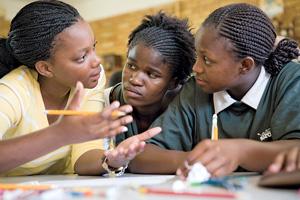
|
Each camper can come to Sizanani only one time, according to a rule that Lilienthal instituted in order to help as many South African kids as possible. “What are we going to do with them afterwards?” Lilienthal remembers Michelle Shorn of HIVSA asking in one of their early meetings. “We’re going to empower them and send them back to where they come from with nothing?” Coming from a U.S. camp culture in which departing kids return to their Wiis and televisions, Lilienthal hadn’t considered what would happen after camp until HIVSA raised the concern. After leaving camp, the Sizanani campers join clubs that meet twice a month at locations all over Soweto. For each eight-hour club meeting, they have a safe place to come to eat, take classes in decision-making and HIV prevention and talk with their beloved vochelis.
Lilienthal notes with a sense of disbelief that the camp he started while in the Peace Corps was patterned almost exclusively after Camp Winnebago. Sizanani, on the other hand, is purely South African, and Lilienthal has consciously made a very light footprint. He is Jewish, for example, but the camp has a strongly Christian bent instigated by the counselors and campers. (Cabin Glamorous Chicks’ fifth rule is “Prayer Before Everything.”) South Africa has 11 official languages, but most of the conversation and songs are in an amalgam of Zulu, English and Sesotho spoken so quickly that it is difficult to pick out the English words. It would be tough for a non-South African to get a foothold without the campers missing out.
Lilienthal does sit in on camp activities from time to time, eats his meals with the campers and is clearly at ease talking with them, but his concern is more about making sure that the camp can continue to run and less about dealing with the minute-by-minute decisions about how that is done. “Phil makes sure that we have everything we need to better these kids, but how we do that, he lets us worry about that,” says Mbali Nkwanyana, the camp director.
On the night of the campfire, as the counselors and campers sing and dance by the orange light of the fire, I look around for Lilienthal, who’d slipped out of the circle. I notice him standing outside the fire circle in the dark of a rural South African night, lit only by the bluish light of his Blackberry. He is tying up loose ends—setting up a fundraising meeting for the next day, making sure a counselor has returned safely from an emergency trip to Soweto—as his camp goes on around him.
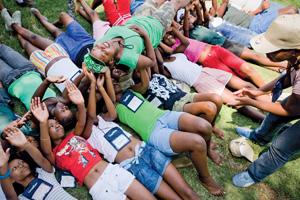 In an activity called the “human zipper,” each camper is passed down the line on the hands of others. |
There are 136 campers here for this session, and 31 counselors. All of the counselors are from the same areas of South Africa that the campers are from, with the exception of five American volunteers. “These kids are from Soweto, the counselors are from Soweto, so they know exactly what the kids need,” Nkwanyana says.
Despite South Africa’s status as one of the richest countries in Africa and a per capita income that puts it firmly on the list of the world’s middle-income countries, intense poverty and the problems that attend it remain. More than 30 percent of the country’s population is unemployed, and the young have been hit particularly hard. Nowhere is this more evident than in the townships of South Africa, the areas, often far outside the city centers, where blacks were cordoned off under decades of apartheid. Although the system has been dismantled, the legacy of apartheid lingers. Blacks continue to live largely in the townships. Nearly all Sizanani campers are from these areas, with the majority from that most infamous of townships, Soweto, just outside of Johannesburg.
To say the word Soweto is to conjure up a place, but Soweto is not one place but hundreds. The word is the shortened version of South Western Townships, an area that comprises more than 30 townships and more than 3 million people, all living in roughly 37 square miles. Driving into it on the main road, with the world’s largest hospital on the left, a maze of disparate shantytowns, called “informal settlements,” and neighborhoods of small one- and two-story homes stretch as far as the eye can see. It was here that the unrest that ultimately destroyed the apartheid system began, and it is here that the many miseries of South Africa thrive.
 The counselors, or vochelis, teach campers about a world beyond their neighborhoods in Soweto, where the unrest that ultimately destroyed the apartheid system began. |
“It might seem like you guys are hopeless to other people, it might seem like you’re the lost generation to some people, but by doing this camp, you can make a difference,” K.B., one of the vochelis, tells the campers. K.B. is in a position to know. Born in Kliptown, a small township within Soweto, he still lives in the one-room shack that was his home years ago, when he came to Sizanani as a camper. But in that time, he has become a leader at the camp, and he worked this past summer at a camp in New York State—experiences that, when he was a camper, “were too far for me to even dream about.” That is the wisdom that K.B. and the other vochelis, together with Nkwanyana and Lilienthal, are trying to convey to the campers: that there is more out there, more they can do. “Nine days doesn’t change everything,” says Lilienthal, “but if we can get a shift ...”
Some campers change more than others, of course, if only because they have gone much farther down the path from which camp tries to rescue them. One day at camp, after a particularly intense lesson on introspection, a 15-year-old boy began to cry. The counselors for that session called in Nkwanyana, and the boy told her his story. He’d become part of a small gang in Soweto that committed minor robberies around their neighborhood. Having learned that his girlfriend’s father, the owner of a supermarket, kept the day’s proceeds in his desk at work at night, the boys planned to break into the store when it was closed, steal the money and split the estimated $5,500. They might have stolen the money and disappeared into the somewhat lawless void of Soweto had the grocer himself not walked in on them in the act. All of the boys were armed, but the camper was the only one who shot. He hit the grocer and then ran. He boarded the bus for camp the next day not knowing whether the man had lived or died.
On the last day of camp, buses carried the campers to Baragwanath Hospital, the drop-off point. As soon as the bus engines died, a car door opened and an older man stepped out. The 15-year-old boy turned to Nkwanyana, fear in his face, and said, “That is the man I shot.” Terrified, Nkwanyana walked with him over to the man. “You should have seen my face,” she recalls. “I didn’t know what was going to happen. I was thinking: what if he had a gun?” There in the parking lot, the man did something far more surprising than shoot. He forgave the boy and said he would not press charges. (No word on whether he let the boy continue to date his daughter, although it seems unlikely. There is forgiveness and then there is dating a man’s daughter.) According to Nkwanyana, the boy wants to get out of the gang but fears for his life if he tries to do so.
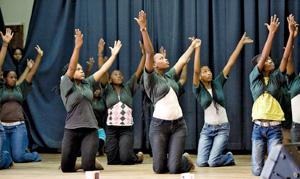 While camp is camp no matter the locale—theater and dance are staples at Sizanani—these are not kids in the sense that Americans conceive of kids. |
My last night at Sizanani is camper skit night. I settle into my seat beside Lilienthal, expecting the usual array of silly skits about so-and-so pushing so-and-so into the pool. Having watched these campers burst into songs so beautiful that they could make you cry while they did something mundane like wait for lunch, I should know better. These campers have little use for the usual and instead want to focus on the bigger picture—on their lives at home, and on what leaving that life behind for a few days has meant to them. Based on the skits, life for these kids consists of drunken fathers, rape, positive HIV tests, gang violence, drugs, theft and pregnancy. In between performances, the vochelis play music over the loudspeaker (“Maputo Song” by DJ Sdunkero and “Single Ladies” by Beyoncé, among others), at which point the campers jump out of their seats and flood the floor, dancing as if their lives depend on it. As soon as the music stops, the campers return to their seats, eagerly awaiting the next cabin’s performance. During Cabin F’s performance, one camper steps out from his group, which is singing behind him, and says in a singsong voice: “You are liberating us. You are liberating us from a sense of being in Soweto, surrounded by calamities like crack-smoking, abuse, sex, drugs, dying.”
A few minutes later, a willowy young girl gets up. She performs a poem with the voice and elegance of a much older woman, and for the first time that night the campers are completely silent. She speaks for all of them as she stands in front of the crowd and ends her poem:
It made me realize,
I had so much to live for,
Nothing to die for.
It gave me life.
It gave me hope.
It was Sizanani.
Elizabeth Chiles Shelburne is a Boston-based writer whose work appears in The Atlantic, among other publications. She is the recipient of a fellowship from the Henry J. Kaiser Family Foundation, which funded her reporting trip to South Africa. Coming soon: Shelburne's personal photo album from her trip.
Photos © Marc Altman 2009, www.marcaltman.com
For more on Global Camps Africa and Camp Sizanani, go to www.globalcampsafrica.org.
 Campers spend a week going through the seven camp activities—adventure, theater, swimming, sports, arts and crafts, nutrition and life skills.
Campers spend a week going through the seven camp activities—adventure, theater, swimming, sports, arts and crafts, nutrition and life skills.